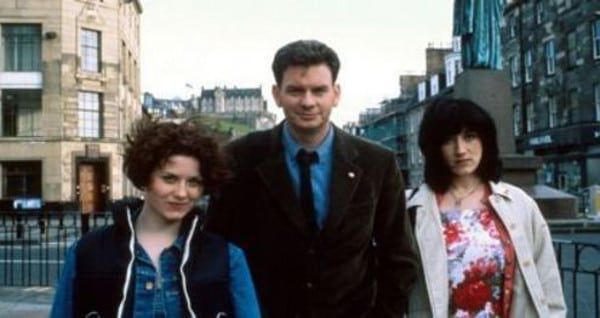Eye For Film >> Movies >> Gregory's Two Girls (1998) Film Review
Gregory's Two Girls
Reviewed by: Angus Wolfe Murray

Gregory is Greg now, or Mr Underwood Sir. He's back where we left him 20 years ago in Gregory's Girl. He hasn't moved, neither has he married. He teaches English at the same school, except his classes are less about Shakespeare and more about the state of the world. He's a sucker for activist discussion groups. "Don't spectate, participate!" Bill Forsyth's return to Scotland and his best known protagonist, after a frustrating period in Hollywood, is not entirely a happy one. The problem lies with the script, which is credibility shy and littered with loose ends.
Greg (John Gordon Sinclair) fantasises about 16-year-old Frances (Carly McKinnon), a pupil in his class, while Bel (Maria Doyle Kennedy), an exceptionally attractive music teacher, tries in vain to get him to come out on a date. Frances and one of her pals (Hugh McCue) believe that the school's most famous old boy, Fraser Rowan (Dougray Scott), an electronics millionaire, is manufacturing torture equipment for Third World governments under the guise of charity work. Gordon Sinclair plays Greg as a gangly nerd, too timid to accept the challenge of Bel's demands and too desperate to forsake dreams of Frances.

If Bel had been less sexy and Frances more flirtatious, the emotional conflict might have made more sense. He is restrained and responsible, avoiding the temptation to do a Monty Python parody, although bursting with comic potential. Scott is stuck with a one-dimentional character, who behaves in baffling ways.
When Greg and Frances break into Rowan's factory to steal evidence of his wrong doing, he knows what they're up to and doesn't seem to give a damn. McKinnon is the most convincing, perhaps because she's a natural on screen and Frances is not complicated by anything as messy as infatuation.
Forsyth introduces other characters, such as Greg's sister and her American boyfriend and a foreign-looking fellow who lurks in doorways with a stray dog, none of whom add more than the sum of their waffle. The culmination of "don't spectate, participate" leaves the audience wondering where to put its sympathy. Rowan isn't hateable - he's papier mache - and the industrial terrorists don't deserve applause. It's a muddle.
Reviewed on: 19 Jan 2001


















